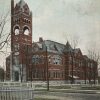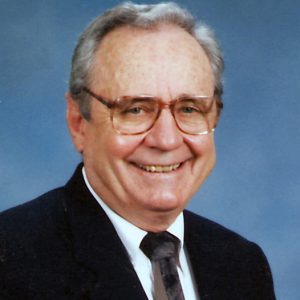calsfoundation@cals.org
Wilson Whitaker Kimbrough Jr. (1926–2001)
Wilson Whitaker Kimbrough Jr. made distinctive contributions to society through his efforts to professionalize law enforcement in Arkansas. He is considered the father of police and criminal psychology in Arkansas and one of the founders of police and criminal psychology in the United States. Throughout his career, he supported many mental health initiatives in northwestern Arkansas and, as a Washington County Quorum Court member, led in the development of prototype job evaluation and salary administration programs.
Wilson Kimbrough Jr., the first son of Lydia Reed Kimbrough and Wilson W. Kimbrough Sr., was born on March 29, 1926, on the family farm northeast of Springdale (Washington and Benton counties). Both his parents were members of pioneer families of the county and were educators who gave most of their service in the county. Kimbrough had two sisters and a brother.
At an early age, Kimbrough began to participate in the family farming operations, where he developed a strong work ethic. He attended Springdale Washington Elementary School and graduated from Springdale Junior/Senior High School in 1943. As a boy, he demonstrated musical interest and some talent. During high school, he took private voice lessons and sang in the school choir. As an adult, he was usually a member of his church choir.
Between high school and enrollment in the University of Arkansas (UA) in Fayetteville (Washington County), Kimbrough worked for six weeks as a mail clerk for the U.S. Department of Agriculture (USDA) in Washington DC. He later noted that delivering mail from the USDA to many parts of the city opened his eyes to the opportunities available to him as a U.S. citizen.
After attending UA for a semester, Kimbrough was admitted on January 21, 1944, to the Naval Reserve Officer’s Training Program as an apprentice seaman and soon was assigned to the Navy V-12 Unit at Central Missouri State Teachers College in Warrensburg, Missouri. On June 23, 1945, he was transferred to the V-12 program at the University of Oklahoma at Norman. In June 1946, he was commissioned as ensign and was billeted to the USS Henrico, a modern transport ship. In the next eleven months, he served as Third Division officer and beach platoon commander. For the first three months of this assignment, the ship operated as support for Operation Crossroads, the historic atomic bomb tests conducted at Bikini Atoll. On May 7, 1947, he was honorably discharged from active duty. On June 5, 1949, he was appointed lieutenant (junior grade) in the Naval Reserve.
Upon his discharge, Kimbrough returned to UA, where he received a BA in 1948 and an MA in 1949, both in psychology. He then began working toward an advanced degree at the University of Maryland at College Park. On July 7, 1951, Kimbrough married Aileen Coolidge Page in Washington DC. They had four sons.
While working toward his doctorate, Kimbrough served as head resident counselor for male students and an instructor at Montgomery Junior College in Silver Spring, Maryland. In 1952, he was appointed instructor in the psychology department at Juniata College in Huntingdon, Pennsylvania, where he became an assistant professor. He received a PhD at the University of Maryland in 1956.
Kimbrough returned to Fayetteville in 1956 and joined the faculty of the psychology department at UA as an assistant professor with emphasis on social psychology. In 1961, he was granted leave for a semester to serve as a visiting lecturer in the psychology department at the University of Florida. In 1969, he became a full professor at UA, where he served until he retired in 1988 and was named professor emeritus.
Between 1957 and 1988, Kimbrough authored or co-authored twenty-four research reports published in nationally recognized journals. During that period, he was invited to address or present papers to nineteen professional meetings or workshops and received nine grants to serve as investigator or co-investigator in a variety of related projects. Kimbrough’s greatest professional contributions involved the field of police and criminal psychology. Beginning in Fayetteville, he and his students led the efforts to professionalize the selection of police officers and fire fighters. The success there soon spread to other Arkansas locations and served as a model for police departments throughout the country. Kimbrough was one of the founders of the Society for Police and Criminal Psychology, a national organization consisting of academic and law enforcement professionals. His students, and the students taught by his students, came to dominate the field and have written books in the field of police selection, hostage negotiation, and threat assessment.
The efforts of Kimbrough and his students provided timely research for practitioners and academicians in developing local and statewide mental health initiatives. He often participated as a panelist or speaker informing the public about the need for, and the opportunities for providing, mental health service.
In 1983, Kimbrough was elected to the Washington County Quorum Court, a legislative body, where he served for sixteen years representing District Six, the area surrounding his home in the Mount Comfort (Washington County) community. While some of his district was in the Fayetteville city limits, much of it was in a rural area of the county. Kimbrough also served ion several Fayetteville city groups. The one on which he placed particular value was the board of directors of the Fayetteville Youth Center (1971–1978), including a term as president. He also provided leadership in his church as a deacon and choir member and in a recreational group, the Rounder Saddle Club.
Kimbrough’s term on the quorum court ended in 1998. On December 10, 2001, during a trip through the county, he died in an automobile accident on U.S. 412 east of Springdale. He is buried in the Mount Comfort Cemetery near his home.
For additional information:
Aamodt, M. G., and Kimbrough, W. W. “Personality Differences between Police and Fire Applicants.” Journal of Police and Criminal Psychology 1 (March 1985): 10–13.
Barker, K., W. W. Kimbrough, and W. M. Heller. A Study of Medication Errors in a Hospital. Little Rock: University of Arkansas for Medical Sciences Medical Center, 1967.
“Former JP, UA professor Kimbrough remembered for his community service.” Northwest Arkansas Times, December 12, 2001, p. 2A.
Henrietta K. Holcomb
Fayetteville, Arkansas
 Divergent Prosperity and the Arc of Reform, 1968–2022
Divergent Prosperity and the Arc of Reform, 1968–2022 Health and Medicine
Health and Medicine Law
Law Mental Health
Mental Health Wilson Kimbrough
Wilson Kimbrough 




Comments
No comments on this entry yet.